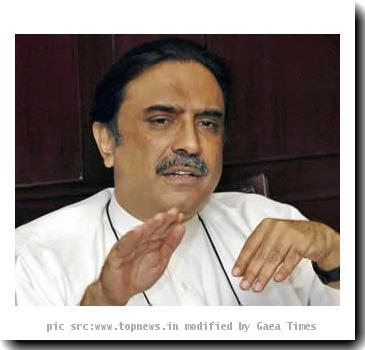Times Square bomb suspect seen as near-perfect recruit for militant groups
By Chris Brummitt, APWednesday, May 5, 2010
NY bomb suspect seen as good recruit for militants
ISLAMABAD — The Pakistani-American accused of trying to explode a bomb in Times Square was able to move easily between the two countries and came from a family of wealth and privilege — a near-perfect background for an international terrorist group wanting to steal into the United States and launch an attack.
Relatives and friends in Pakistan said Wednesday that Faisal Shahzad showed no sign of radicalization before he left for the United States at age 18 to study, and that he and his family were not religious.
Shahzad’s last journey to Pakistan was a five-month trip that ended in February.
One relative said he noticed a difference in him only after he had spent several years in the U.S.
“I saw a little change in him. When he was here, he was not religious-minded. But he was when he came back from the United States,” said Nasir Khan, a relative in the family’s ancestral village of Mohib Banda in northwest Pakistan. He said he remembered Shahzad talking about the problems of Muslims in Iraq and Afghanistan.
Authorities say Shahzad has admitted his role in the bombing plot and is cooperating with investigators, but they don’t yet know whether others were involved. U.S. officials said Wednesday they’ve been unable to verify statements that Shahzad trained to make bombs at a terrorist camp in Pakistan, according to the complaint against him, and haven’t linked him to any terrorist group.
The susceptibility of Muslim immigrants — or their offspring — to extremist, violent forms of Islam has long been noted. The most often cited reason for this is the ability of Islam to give people a clear sense of identity in an unfriendly and confusing environment.
The four suicide bombers who attacked the London transportation system in 2005 were British Muslims, two of whom who had traveled to Pakistan. Five young Americans — two of Pakistani descent — are on trial in Pakistan facing terrorism charges. One left behind a farewell video showing scenes of war and casualties, and saying Muslims must be defended.
“He had a good life back home before he came to the United States, so the question is, ‘What went wrong?’” said Kamran Bokhari, an analyst with STRATFOR, a private security think tank in Austin, Texas. “I suspect he never integrated into mainstream American life and was susceptible to conspiracy theories about Muslims being under threat.”
Shahzad, who became a U.S. citizen last year, is accused of trying to detonate a crude gasoline-and-propane bomb inside an SUV in bustling Times Square on Saturday evening.
The 30-year-old, who was arrested Monday night in New York after boarding a flight to leave the country, has allegedly told investigators he received explosives training in Waziristan, a stronghold of the Pakistani Taliban, but his links to any of the many militant groups based in Pakistan are still unclear.
In Washington, State Department spokesman P.J. Crowley said the top U.S. diplomat in Pakistan, Ambassador Anne Patterson, has met with Pakistani President Asif Ali Zardari and with other senior officials to discuss the investigation.
Richard Holbrooke, special U.S. envoy to Afghanistan and Pakistan, also talked Wednesday with Pakistani Foreign Minister Shah Mahmood Qureshi, Crowley said, adding that the United States and Pakistan are cooperating.
“They recognize, as we do, that this is a shared responsibility and a shared threat to both of us,” Crowley said.
Intelligence officers say they have detained several people in the country’s commercial capital, Karachi, for links to Shahzad.
Interior Minister Rehman Malik confirmed that several people, including some of Shahzad’s family members, had been taken in for questioning but that none had been “formally arrested.”
On Wednesday, an intelligence officer said one of those detained was an activist named Mohammad Rehan, with the al-Qaida-linked militant group Jaish-e-Mohammad. He was picked up on Tuesday at a mosque associated with the group, said the officer, who asked not to be identified in line with the policy of his agency.
He said authorities believe Rehan may have traveled with Shahzad to Peshawar, a main jumping off point to the Afghan border region. Jaish-e-Mohammad was once believed linked to Pakistani intelligence agencies, which used it to fight in Indian-ruled parts of the Kashmir region.
Unlike the mostly poor Pakistanis who make up the foot soldiers in the insurgency that is ravaging the country, Shahzad is from a wealthy family. His father was a vice marshal in the air force, meaning he would have been given respect as the son of a senior officer in Pakistan’s most powerful institution.
Shahzad has a brother who is a mechanical engineer in Canada, a sister who is a doctor at a hospital in Peshawar, and another sister who previously worked as a school teacher, said Kifyat Ali, a cousin of Shahzad’s father. His wife was an American of Pakistani descent who, according to her page on social networking site Orkut, liked shopping, American TV comedies and “partying every night.”
Khan said Shahzad went to expensive schools, including one in Peshawar, that are mostly attended by the children of army officers. He is also reported to have lived in Karachi in the 1990s when his father, Baharul Haq, retired from the air force and became deputy director of the civil aviation authority.
Abdul Aziz, a retired lieutenant colonel in the air force, said Haq and his family were not religious.
“I have never seen them at prayer; forget about them being tilted to religious extremism,” he said. “I knew Faisal as a shy and humble and decent chap who used to love pets. He used to keep dogs and parrots at his home.”
Waziristan is home to militants from all over the world, Pakistani Taliban fighters and senior al-Qaida operatives.
The day after the Times Square incident, the Pakistani Taliban put out a video claiming responsibility, but U.S. officials have cast doubt on that claim, which if true would be first time it has struck outside South Asia.
Al-Qaida and other international militant groups are known to actively seek out recruits with Western passports to avoid scrutiny when traveling across the world. Shahzad, who had American citizenship, would have been a highly praised recruit.
“What better candidate than a person who has a U.S. passport and is willing to do something like this? Of course, the Pakistani Taliban or whoever is going to be interested,” said Moeed Yusuf, from the Washington-based think tank, United States Institute of Peace. “Who is going to suspect you until you do something?”
The emerging signs of a link between the failed attack and Pakistan may increase pressure on the Pakistani army to launch a new offensive in the northern part of Waziristan, something it has been avoiding until now. U.S. and European officials have long said that many of the terror plots in the West are hatched in the region.
Associated Press writers Riaz Khan in Mohib Banda, Zarar Khan in Peshawar, Munir Ahmed in Islamabad and Ashraf Khan and Kathy Gannon in Karachi contributed to this report.
Tags: Afghanistan, Asia, Asif Ali Zardari, Central Asia, Islamabad, Karachi, New York, New York City, North America, Pakistan, Peshawar, Political Organizations, South Asia, Terrorism, Think Tanks, United States

